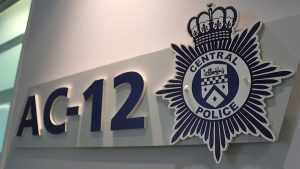
From serving in the Line of Duty to serving God
It’s not every day you get to meet someone who was in the real Line of Duty and find out he’s answered the call to ordination. For the very small percentage of the population who don’t know what Line of Duty is, it’s a smash-hit BBC TV series about police investigating corruption in the police.
Keiren Marwood served for 30 years in the Met, topping off his career in anti-corruption, before retiring to Cornwall with his wife, Caroline. He didn’t know then what God had planned for him. “Other people had suggested ordination at various points in my life, including Caroline, but I definitely wasn’t seeing it in myself,” he says.
The call to ordination
The couple went to Towednack Church, a different tradition for them, but both got stuck in, becoming church wardens and doing what they could to support it. “Sometimes it’s not about what you can get but what you can give. But after a while, I started to hear God’s voice telling me to be the change I wanted to see,” says Keiren. So, he approached Revd Elizabeth Foot, thinking maybe he could become a Reader, but Elizabeth said no, she really felt he was being called to ordination.
“Sometimes it’s not about what you can get but what you can give. But after a while, I started to hear God’s voice telling me to be the change I wanted to see.”
And so began the discernment process. Like many who are called to serve God with ordination, Keiren didn’t feel good enough. But he looked to who Jesus called to follow Him – they weren’t the super-spiritual, the religious or academic elite. They were the fishermen, the hot-headed, like Peter, and even the tent-maker with a passion for killing Christians, like Paul. “He calls who He calls,” says Keiren.
You don’t have to come as the full package
“I learnt that you don’t have to come as the full package,” he says. But being open to change can be a challenge. “I thought, I’m a 55-year-old man, self-aware, seen a lot of life experience and keen to get on with it. I admit, I thought the process was something I’d just have to get through. But it was so much more than that. It was, and still is, a journey of faith of which the training and discernment are the transformative and formative part.”
“Being at the top of my game in the police I’ve had to start again, accept criticism, be vulnerable, open and make sacrifices.”
Keiren has changed in ways that are hard for him to articulate. “Being at the top of my game in the police I’ve had to start again, accept criticism, be vulnerable, open and make sacrifices. It’s not an easy road and a lot is expected of you – academic work, parish life and family life, how can I juggle that?” But he did and found that the intensity and demands have made him stronger and more faithful in his prayer and personal life.
Nothing is wasted in God’s economy
When reflecting on the huge transition in his life from the Met to today, Keiren is pragmatic. “Nothing is wasted in God’s economy,” he says. He witnessed things more shocking than any TV drama. On hearing one man’s confession to a particularly harrowing crime, instead of judgement and condemnation, Keiren felt a tremendous sadness. “He’d been abused as a child, he couldn’t read or write and was very vulnerable in his own right. I saw his brokenness and in a strange way I was able to listen to him with a degree of humanity. I couldn’t have done that on my own. Seeing him through Christ’s eyes changed my perspective.”
“I saw his brokenness and in a strange way I was able to listen to him with a degree of humanity. I couldn’t have done that on my own. Seeing him through Christ’s eyes changed my perspective.”
Working as a hospital chaplain
He’s found that his previous work life has stood him in good stead for his additional work as a chaplain at the Royal Cornwall Hospital. It’s a job he loves. “In many ways it’s like being in the police. I never know what I’m going to walk into, but what I’ve come to realise is that in every case, Jesus has gone ahead of me and is already there, in the room. I’m just there to carry out what He’s started.”
“I’ve come to realise that in every case, Jesus has gone ahead of me and is already there, in the room. I’m just there to carry out what He’s started.”
The work is very rewarding but can be immensely demanding. People are often in pain, physically and emotionally. A few times, Keiren has been called out for an infant death, or to baptise a baby who is close to death. “It’s terribly sad. Sometimes there is nothing that can be said, it’s just about being there. Being alongside people in their pain, listening, or holding their hand while they cry.”
Wearing a dog collar
Would he wear his dog collar after ordination? “It’s a dilemma. In some ways it’s a recognised emblem that can draw people in, but it can also be a barrier. A lot of people are hurting, angry and fearful of organised religion. As a chaplain I’m there for everybody, of every religion and none.” Sadly, many see the church, and God, as judgemental which can be a sensitive issue around, for example, attempted suicide. Keiren is keen to reassure otherwise. “If I can let people know that they are loved unconditionally, supported and valued, then I’ve done my job.”
And Line of Duty…?

The fictional AC-12 from BBC’s Line of Duty
It had to be asked, what did he think of Line of Duty? He laughs and disappointingly says he never watched it.
Keiren will take up a position at St Ives and Hasletown
